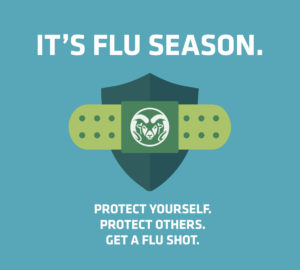Flu season has arrived in Colorado.
After a relatively slow start to flu season in fall 2018, local public health officials are now reporting increased flu activity throughout Larimer County. CSU Health Network reports typical flu activity for January, with several confirmed positive flu tests among student patients so far in 2019.
Flu shots still available
The best way to prevent the flu is to get a flu shot each year. Flu shots have been shown to reduce the risk of flu illnesses, hospitalizations and the risk of flu-related death in children, the elderly and those with compromised immune systems.
Flu shots are still available and it is not too late to protect yourself and others by getting a flu shot.
CSU students
• CSU Health Network Immunizations Department, located on the second floor of the CSU Health and Medical Center, has 200 doses of the flu shot remaining (as of Feb. 1). Students can walk-in during normal operating hours; no appointment is necessary. Information will be posted on the CSU Health Network website when flu shots are no longer available at this location.
• Flu shots also are available at several other locations, including local pharmacies and medical clinics.
• The flu shot is a covered benefit, meaning there is no additional out-of-pocket cost, under most health insurance plans including the CSU-sponsored Student Health Insurance Plan. Contact your insurance company in advance if you have questions about cost.
CSU staff and faculty
• Any employee covered under a CSU Anthem plan or a state UHC or Kaiser plan can get a flu shot at no cost as long as it is administered at an in-network pharmacy or health care provider. Call the number on the back of your insurance card to determine in-network locations.
• Those with Medicaid coverage, who are uninsured, or who have health insurance that does not cover the flu shot can visit the Larimer County Health Department to receive a flu shot. Walk-ins are available 10 a.m.-2 p.m. on Feb. 9 and March 9, or call (970) 498-6700 to make an appointment.
Flu symptoms and treatment
In general, the flu is worse than the common cold, and symptoms such as fever, chills, body aches, headache, extreme tiredness, and dry cough are more common and intense. Some people who have been infected with the influenza virus also have reported diarrhea and vomiting.
If you think you have the flu, it is important to stay home and rest. This allows for quicker recovery time and limits the spread of the flu to others, including classmates and coworkers.
Antiviral medications are recommended as early as possible for people at a higher risk for flu complications who develop flu symptoms, including those with underlying medical conditions like asthma and diabetes. Most people who are otherwise healthy and get the flu do not need to be treated with antiviral drugs.
Seek medical attention for the flu if you have chronic health conditions such as asthma or heart disease, are pregnant, have a fever of 101.0 F or higher for more than three days, are experiencing wheezing, abdominal discomfort, drainage from the eyes or ear pain, or if you are experiencing worsening symptoms after five to seven days.
Seek emergency medical attention if you have chest pain or shortness of breath, difficulty breathing (other than nasal congestion), severe abdominal pain, dizziness or confusion, severe headache or inability to keep down liquids.
Cold and flu prevention
In addition to getting a flu shot, follow these good health habits to help stop the spread of germs and prevent respiratory illnesses like cold and flu.
- Wash your hands frequently.
Clean your hands with warm, soapy water, rubbing your hands together for at least 15 seconds, especially after coughing or sneezing. Alcohol-based hand gels are also effective if soap and water are not available, unless hands are visibly soiled. - Stay home when you are sick.
If possible, stay home from work, school and errands when you are sick. This will help prevent spreading your illness to others. - Cover your cough.
Cover your mouth and nose with a tissue when you cough or sneeze, or cough or sneeze into your sleeves, not your hands. - Avoid touching your eyes, nose or mouth.
Germs are often spread when a person touches something that is contaminated with germs and then touches their eyes, nose, or mouth. - Perform routine cleaning.
Disinfect items and surfaces likely to have frequent hand contact like door knobs, phones, keyboards, counters, desks, remote controls and refrigerator handles. - Engage in immune-boosting activities.
Prioritize your well-being by getting plenty of sleep, managing your stress, engaging in physical activity and maintaining a healthy diet.
For more information about the flu, flu shots and cold and flu prevention, visit Centers for Disease Control and Prevention, Larimer County Department of Health and Environment and CSU Health Network.